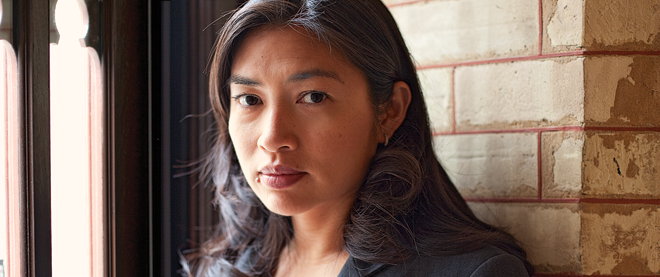Mellissa Fung and her captors
The CBC reporter held in Afghanistan resisted, defied and then forgave them
Photograph by Jessica Darmanin
Share

This article originally ran May 13, 2011
“Do you want to see where I was stabbed?” Mellissa Fung asks, pulling aside the strap of her sleeveless pink blouse and pointing to the back of her right shoulder. The CBC reporter is proud of the bruise-like wound: it marks the resistance she put up during her abduction outside of Kabul in 2008.
A similar spirit of refusal animates Under an Afghan Sky, Fung’s memoir of her kidnapping and 28-day captivity in an underground hole the size of a closet. The publicity tour has brought her to a Toronto hotel, where she’s politely, if reluctantly, discussing it. “I’m an old-school journalist,” the 38-year-old says. “I’d rather tell the story than be the story.”
She was a hesitant memoirist, too. “I wanted to move on.” Dredging it up again was “pretty horrible,” she says, but she needed to address “misinformation”—that money or Taliban members were exchanged for her release. A screenplay was rumoured to be in the works. “I wanted my own record, the way I remembered it,” says Fung, a self-described “control freak.”
The book chronicles the day-to-day of her incarceration—the disgusting conditions, subsisting on boxed juice and cookies and stoking hope by reciting the rosary and writing letters to her friends and boyfriend, CTV’s Paul Workman. Fung coped in part by fretting about trivial concerns—email withdrawal, fear that pomegranate juice would stain her teeth, or that she was going to miss a planned holiday with Workman in Dubai. “I had to look ahead in order to keep myself sane,” Fung says. “The moments I felt myself spiral to a bad place, I had to catch myself.”
Her relations with her captors, “small-time thugs” looking for a big payday, are complex, bouncing from naive trust to life-imperilling defiance. She was lucky to be a woman, they told her, because one of them would care for her. They showed odd flashes of kindness: providing cigarettes, giving her an alarm clock after they smashed her watch thinking it was a GPS device, and letting her play video games on their cellphone. She developed a bond with one, an English speaker who talked about becoming a suicide bomber with his girlfriend. Only toward her captivity’s end did she realize they weren’t telling her the truth, she says. Even now, she expresses surprise they seized all of her notebooks.
Refusing to see herself as a victim, Fung chose to refer obliquely to being sexually assaulted by one of the men early on; it is never mentioned again. “I couldn’t let it in,” she explains. “It helped that he never came back.” She didn’t want to write about it at all, she says, fearing it would be used as ammunition against sending women to a conflict zone. A CBC colleague who read an early draft told her she had to be more explicit or she’d face questions.
After the assault, Fung was often lippy and resistant with her captors, so much so, she reveals, that the gang’s ringleader in Pakistan told negotiators, “We’ve had it up to here with her.” She touches only briefly on the terms of her release, writing she was exchanged for the ringleader’s mother who’d been taken into custody. She has forgiven her captors, who are still at large. “There’s no point. They’re not here to get angry at.” She’s less forgiving of herself for causing her family and friends worry: “That’s the worst thing.”
The memoir is not burdened by political or retrospective reflection. Of the controversial media blackout surrounding her kidnapping, Fung says she’s conflicted: “I still don’t know what I think.” She expresses frustration that she isn’t able to return to Afghanistan to work. Her bosses fear she’s at higher risk, she says. Still, she’s plotting a way back, seeing an opportunity if Peter Mansbridge returns for a tour: “Nothing happens when Peter’s there, knock on wood, there are so many people around.” All of the attention given her is “unfair,” she says: “It was one small thing that happened to me. Women in Afghanistan are raped and abused every day. So are children. I want to tell those stories.”
One story she doesn’t want to see is hers on the big screen. “People ask me, ‘Who’s going to play you in the movie?’ ” But there will be no movie, Fung vows: “No, no, no, no.”